We are moving to a new pagepublished at 04:45 GMT 8 December 2023
For technical reasons we are continuing our live coverage on a different page. Please join us there.
Tens of thousands of Palestinians are streaming into Rafah to escape intense fighting elsewhere in the south of the Gaza Strip
A BBC reporter in Gaza says the city has no food or electricity, and there are severe water shortages
Thousands have tried to go to UN schools to find shelter, but have had to sleep in front of buildings as there is no room for them
The Israeli military is now deep into Khan Younis, a city to which civilians in north Gaza had previously been told to flee
Hamas attacked Israel in October, killing 1,200 people and taking 240 hostages, some of whom were released during a short-lived truce
Hamas officials in Gaza say Israel has killed more than 17,177 people in its retaliatory campaign, including about 7,000 children
Edited by Patrick Jackson
For technical reasons we are continuing our live coverage on a different page. Please join us there.
 Paul Adams
Paul Adams
Diplomatic correspondent, reporting from Jerusalem
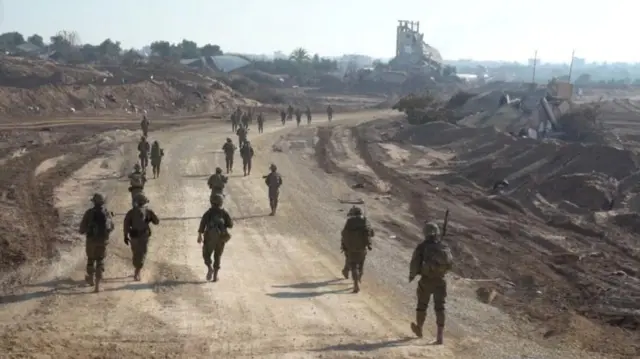 Image source, Reuters
Image source, ReutersIsrael's military operations in Gaza continue
This Gaza war, unprecedented in scope, has now been raging for two months. The Hamas-run health ministry says more 17,000 people have been killed, including thousands of children.
Israel’s military operation in the southern Gaza Strip, currently focussed on the largest city there, Khan Younis, is making a difficult humanitarian situation worse. The UN says 80% of the population has been displaced. People are running out of safe havens and not enough aid is getting in. Speaking in Geneva, the UN’s top aid official, Martin Griffiths, gave this bleak assessment.
Griffiths said negotiations were under way with Israel to improve the flow of aid. Israeli officials say are willing to do what they can, to increase the amount of aid coming in and to facilitate the opening of additional field hospitals to help cope with the vast number of casualties. On his first visit to the region since the crisis began, the UK Defence Secretary, Grant Schapps, said other routes were being looked at that could involve the Royal Navy.
With fighting raging around Khan Younis and in the north, images are circulating on social media showing dozens of Palestinian men, stripped to their underwear, kneeling on the ground, being guarded by Israeli soldiers. Other pictures show them being transported in military trucks.
Israel’s chief military spokesman, Daniel Hagari, said hundreds of what he called terror suspects had been detained and that many had given themselves up. But already one well-known Palestinian journalist has been identified among those being held.
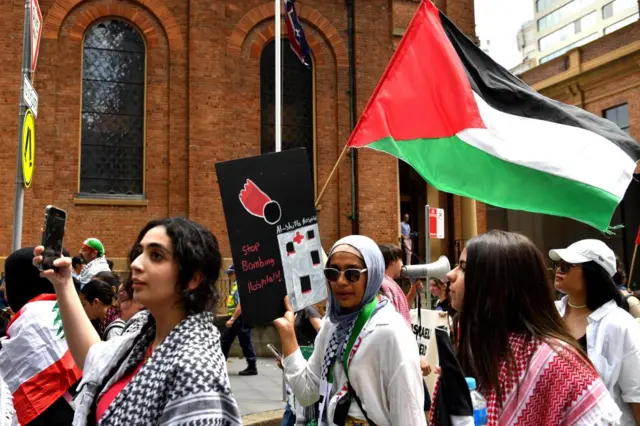 Image source, EPA
Image source, EPAPro-Palestinian protesters marched in Sydney on Thursday
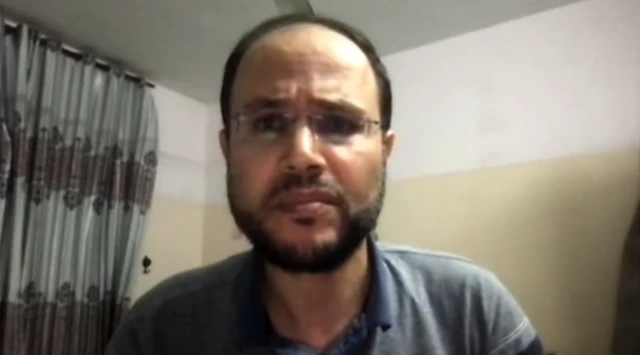
Palestinians are mourning the death of well-known Gazan writer and literary scholar Refaat Alareer, who was killed in an Israeli air strike in Gaza City on Wednesday.
Alareer’s father-in-law said he had died along with his brother and sister and four of her children.
He had taught literature at Gaza’s Islamic University, which was destroyed by a series of rapid Israeli air strikes on 11 October.
Israel said the university was an "important Hamas operational, political and military centre in Gaza”.
Alareer was also one of the founders of “We Are Not Numbers”, a Palestinian non-profit set up in 2015 to “tell the stories behind the numbers of Palestinians in the news”.
He had declined to leave northern Gaza following the start of Israeli operations in the area, and two days before he died posted video to social media in which a number of explosions could be heard.
"The building is shaking. The debris and shrapnel are hitting the walls and flying in the streets," he wrote.
In an interview with the BBC in the hours after Hamas's 7 October attack, Alareer caused huge offence by calling it “legitimate and moral” and “exactly like the Warsaw Ghetto Uprising”.
The Warsaw Ghetto Uprising was a revolt that took place in German-occupied Poland in 1943 and saw Jews use weapons smuggled into the ghetto to try to resist Nazi efforts to transport people to the extermination camps.
Following the outcry over the interview, a BBC spokesperson, external said: "We reported the Hamas attacks and the response by Israel in line with the BBC’s Editorial Guidelines.
"We have included contributors who have condemned the attackers as terrorists and we have reported that Hamas is designated as a terrorist group by many Western governments, including the UK.
"While an interviewee who made comments on the Warsaw Ghetto was robustly challenged on air, we agree his comments were offensive and we don’t intend to use him again.”
We aren't able to give you lot of detail about what's happening in Gaza's southern city of Khan Younis, one of the main focuses of the current fighting. Israel said on Wednesday its forces were encircling the area. On Thursday it said it had "killed Hamas terrorists and struck dozens of terror targets" in the city.
We are receiving images from the city via news agencies. Many of them are too distressing and graphic to show here, including scenes of injured people being carried into hospital, and others of people lying on crowded floors awaiting treatment - with woman and small children among them.
Here are a few photographs of events in the city today. You may find some of them distressing.
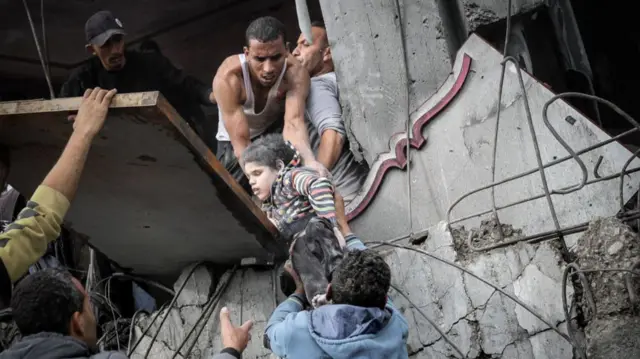 Image source, Getty Images
Image source, Getty Images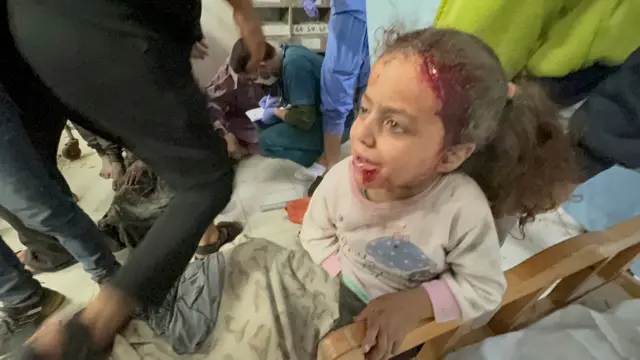 Image source, Reuters
Image source, Reuters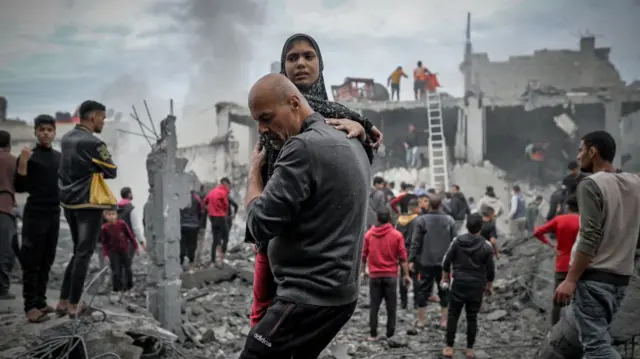 Image source, Getty Images
Image source, Getty Images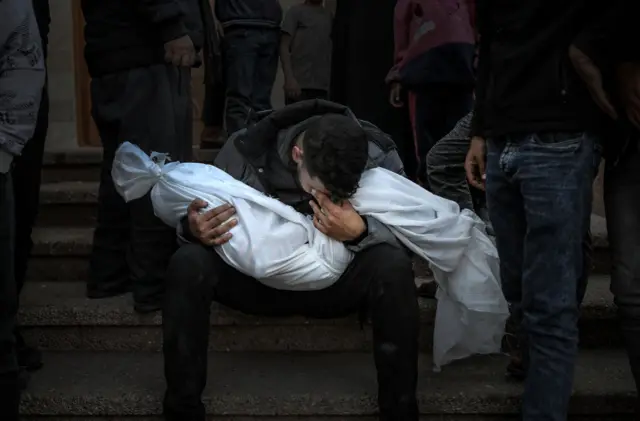 Image source, Getty Images
Image source, Getty Images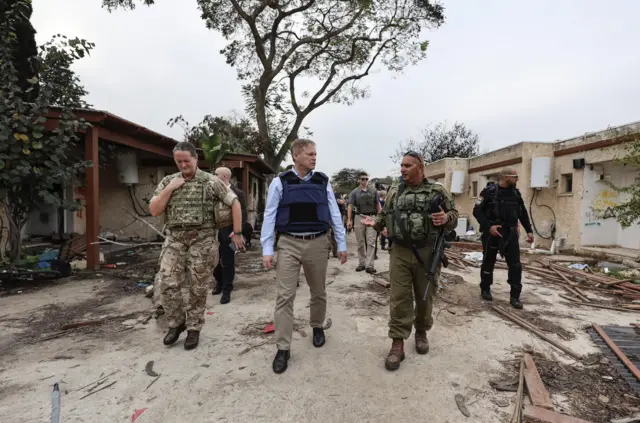 Image source, X / @grantshapps
Image source, X / @grantshappsShapps shared this picture from Kibbutz Kfar
UK Defence Secretary Grant Shapps, who has been in Israel since Wednesday, has visited Kibbutz Kfar in southern Israel which was attacked by Hamas on 7 October.
Saying that a rocket was brought down moments after he went to the kibbutz, he wrote on X: “All a stark reminder that a sustainable two-state solution is needed now more than ever.”
Earlier he met his Israeli counterpart Yoav Gallant in Tel Aviv. After their meeting Gallant said, “We are determined to win, and we will prevail.”
Shapps had said that he would use the trip to discuss more aid for Gaza to be delivered faster, including by the sea directly to Gaza.
He was in the West Bank earlier this morning and said that the world needed to get more aid to the “innocents” caught up in the war in Gaza.
Jewish people in Tel Aviv have been observing the start of Hanukkah, the Jewish Festival of Lights, by holding an event to highlight the hostages still being held in Gaza.
Hanukkah, or Chanukah as it is also known, runs from 7 to 15 December this year.
The word Hanukkah means rededication and commemorates the Jews' struggle for religious freedom.
Hanukkah dates back to two centuries before the beginning of Christianity and begins on the 25th day of Kislev, a month which occurs in November and December on the Gregorian calendar.
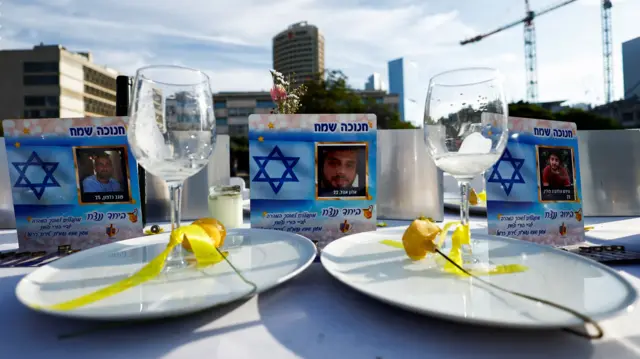 Image source, Reuters
Image source, ReutersThere's a sombre note to this year's festival, as 138 people are still held captive by Hamas and other armed groups in Gaza
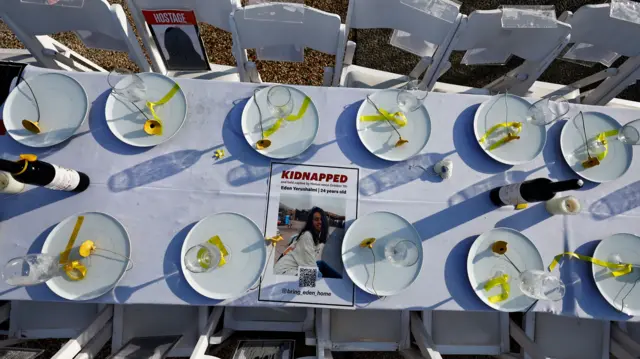 Image source, Reuters
Image source, ReutersThis dinner table with empty chairs in Tel Aviv was set up to represent the hostages
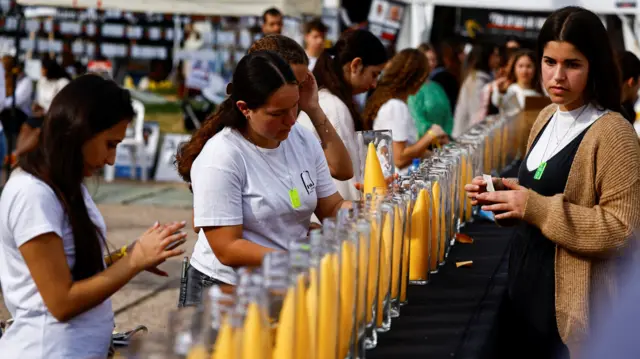 Image source, Reuters
Image source, ReutersAs part of the event, people lit a candle for each of the 138 captives
The festival will be marked by Jews across the world with the president of the Union of Jewish Students in the UK, Edward Isaacs, saying it will be "more pertinent than ever before" this year.
In Germany, Chancellor Olaf Scholz attended a ceremony to light the first candle in a giant menorah at Berlin’s Brandenburg Gate.
It was the first time that a German chancellor had attended the annual event and it comes amid a rise in anti-Semitic incidents in the country.
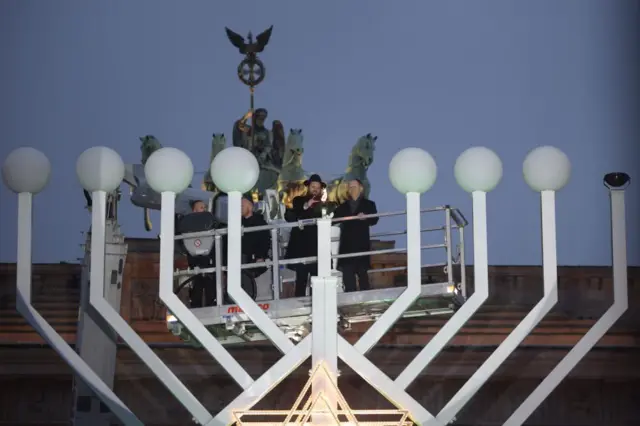 Image source, CLEMENS BILAN/EPA-EFE/REX/Shutterstock
Image source, CLEMENS BILAN/EPA-EFE/REX/ShutterstockGerman Chancellor Olaf Scholz (R) lights a candle next to Chairman of the Jewish Education Center Chabad Rabbi Yehuda Teichta
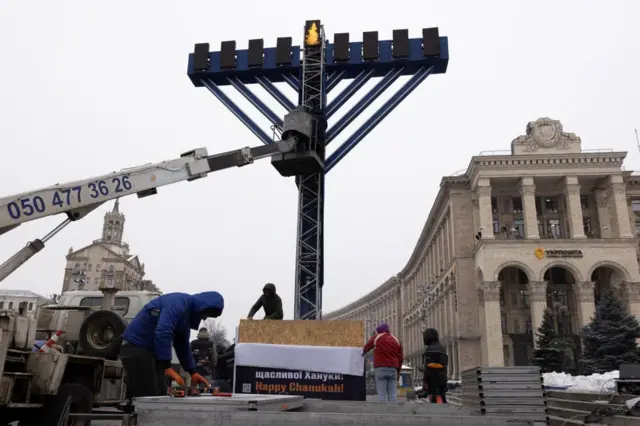 Image source, Reuters
Image source, ReutersIn Ukraine's capital Kyiv, a giant candelabra known as a menorah, has been set up in Independence Square
 Paul Adams
Paul Adams
Diplomatic correspondent, reporting from Jerusalem
I've been speaking Dr Nasser, a senior clinician sheltering at the European hospital in Khan Younis, the city in southern Gaza which has seen intense fighting over the last few days,
"I will be honest with you, I am very hungry and I have low energy," he says.
Quote MessageI have been hungry for a while now. We only received food aid once, and it was mostly biscuits and canned food"
Dr Nasser
Nasser says if he does manage to secure any food, he makes sure his children eat.
"I have not experienced the feeling of being full for weeks," he continues.
He tells me his children are afraid of the dark and the sound of bombing terrifies them.
Quote MessageMy son is five years old and he asks me to get him rice and meat. He doesn't understand that his father is more hungry than he is."
Dr Nasser
Let's turn our attention to the White House now, where national security spokesperson John Kirby told a briefing Washington was "not close to inking another deal on a humanitarian pause".
He also said there was no update to share on the return of hostages from Gaza.
Meanwhile, White House national security aide John Finer has been giving an address at the Aspen Security Forum - during which he said the US has not given Israel a firm deadline to end its operations in Gaza.
In comments reported by Reuters, he said that if the war ended now, Hamas would continue to pose a threat to Israel.
Finer said there hadd been aspects of how Israel's military operations in northern Gaza had been conducted that did not show "sufficient care" for civilian life.
"We work day in, day out, and engage directly, day in, day out, including today, frankly, between the president and the [Israeli] prime minister on how the conflict is being conducted in all parts of Gaza, but with a particular focus on the south," Finer said.
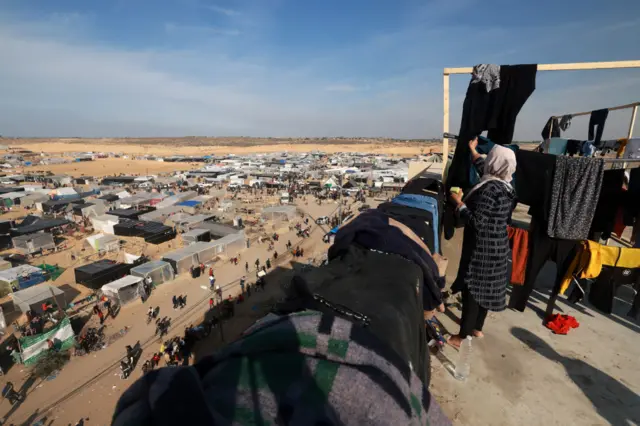 Image source, Getty Images
Image source, Getty ImagesA camp has been set up in Rafah
It's almost 23:30 in Israel and Gaza, and 21:30 here in our London newsroom. Here’s a recap of what’s been happening today:
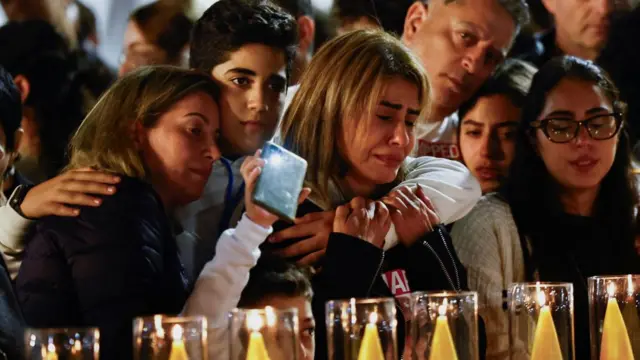 Image source, Reuters
Image source, ReutersFamilies of hostages have been gathering in Karmiel, northern Israel, as the country observes the Jewish festival Hanukkah.
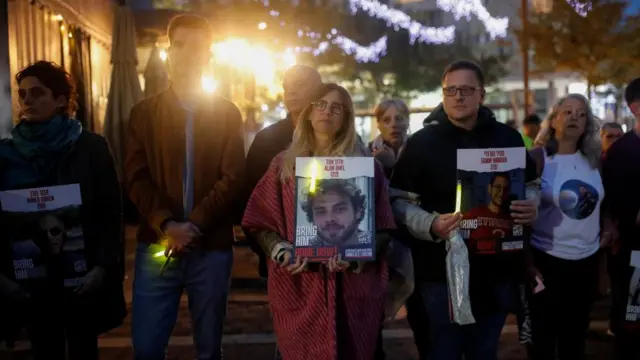 Image source, Reuters
Image source, ReutersIdit Ohel, mother of Alon Ohel, 22, who is believed to be being held in Gaza, and her family were among those who lit candles in the city this evening
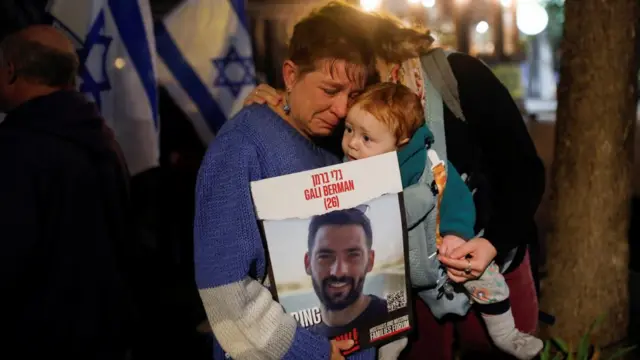 Image source, Reuters
Image source, ReutersIsrael says 138 hostages seized by Hamas gunmen on 7 October are still in captivity in Gaza - 110 people were freed during the week-long truce which has now broken down
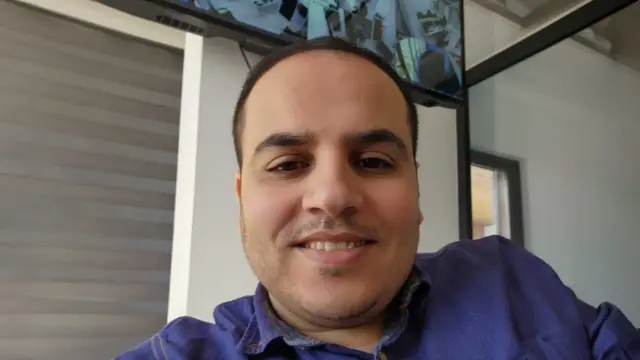 Image source, Al-Araby Al-Jadeed
Image source, Al-Araby Al-JadeedThe news outlet Al-Araby al-Jadeed has condemned what it describes as the "humiliating" detention of its Gaza correspondent Diaa Kahlout by Israeli forces earlier today.
In a statement, it said Kahlout's brothers, relatives and a large number of civilians were also detained by the Israeli forces in Beit Lahia, a city in the north of Gaza.
It adds soldiers forced them "to disrobe, and subjected them to invasive searches and humiliating treatment upon their arrest, prior to transporting them to undisclosed locations".
The outlet "urges the international community, journalists’ rights defenders and watchdogs, and human rights bodies to denounce this ongoing assault" by Israel on journalists in the territory.
The BBC has asked the Israeli military about Kahlout's reported detention.
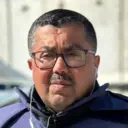 Adnan El-Bursh
Adnan El-Bursh
BBC Arabic, reporting from Gaza
In the north of Gaza, local journalists in the area tell me Israeli shelling has intensified on Halab Elementary School, located close to the Indonesian Hospital, in Beit Lahiya. It is a big primary school which has been used as a shelter on the edge of Jabalia camp.
The shelling is reported to have killed and wounded many of the displaced.
Unverified images of the dead bodies of mothers hugging their children in the vicinity of the school have been circulating on social media.
Hundreds have fled the school and nearby schools in Jabalia camp, following the shelling, and headed to the town of Jabalia. Some headed to schools under construction for protection.
Meanwhile, Israeli shelling continues to intensify in the southern city of Khan Younis. More than 400 people were killed Gaza during the past 24 hours, pushing the death toll to 17,717 people, according to the Hamas-run Palestinian health ministry.
The BBC has asked the Israeli military for comment about events at the Halab Elementary School.
 Paul Adams
Paul Adams
Diplomatic correspondent, reporting from Jerusalem
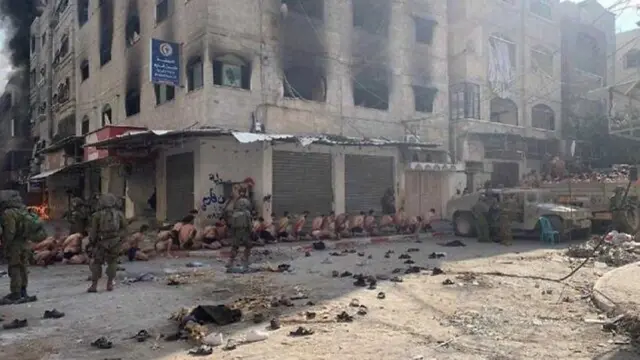 Image source, Image from social media
Image source, Image from social mediaWith fighting raging around Khan Younis and in the north, a video is circulating on social media, showing dozens of Palestinian men, stripped to their underwear, kneeling on the ground, being guarded by Israeli soldiers.
The men are thought to have been arrested in Beit Lahiya, in the far north of the Gaza Strip.
They appear to have been told to remove their shoes, which are seen scattered across the road.
Other images show them being transported in military trucks. In the Israeli media, the captives are being described as Hamas fighters who have surrendered.
The final image shows the men, bound and blindfolded, kneeling in a large area of bulldozed sand.
One well-known Palestinian journalist, Diaa Al-Kahlout, a correspondent for The New Arab, has been identified among those being held.
The New Arab said al-Kahlout had been arrested along with his brothers, relatives “and other civilians”.
Israel Defence Forces (IDF) spokesman Daniel Hagari said: “IDF fighters and Shin Bet officers detained and interrogated hundreds of terror suspects. Many of them also turned themselves in to our forces during the past 24 hours. The intelligence coming out of their interrogations is utilised to continue the fighting.”
Watch: Gaza's food queues get longer and the hungry jump fences
The UN's aid coordinator has today warned that it does not have a humanitarian operation "that can be called by that name any more".
We’ve seen footage of Palestinians waiting outside an aid centre, some of them are climbing over a fence as the queues behind them grow longer.
 Paul Adams
Paul Adams
Diplomatic correspondent, reporting from Jerusalem
Israel says it will reopen one of its main Gaza crossing points for the inspection of aid trucks, within the coming few days.
The Kerem Shalom crossing has been closed since 7 October. All trucks carrying aid destined for Gaza are currently inspected by Israeli officials at Nitzana, 25 miles south along the Egyptian-Israeli border. Inspected trucks then travel to Rafah, where they enter Gaza.
Israel says there’s nothing wrong with the process, which it says is capable of handling up to 200 trucks a day.
Col Elad Goren, Head of the Civil Department of the Coordinator of Government Activities in the Territories (COGAT) told journalists the problem was one of logistics and the capacity of aid agencies to deal with sufficient volumes of aid. But Kerem Shalom, he said, would be needed if the agencies wanted to process more than 200 trucks a day.
Speaking in Geneva, the UN’s top aid official, Martin Griffiths, said there were “promising signs” that Kerem Shalom might soon be open. But Col Goren indicated that the facility would only function as an additional inspection facility, not as entry point into Gaza. Israel has banned all aid from crossing directly into Gaza since 7 October.
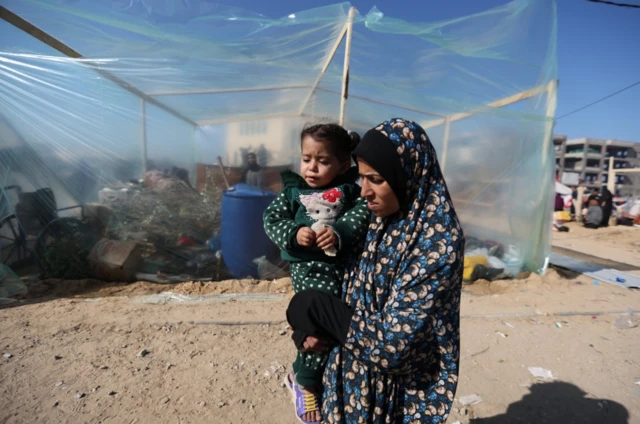 Image source, Reuters
Image source, ReutersAs our reporter Adnan El-Bursh, who is in Rafah at the southern edge of the Gaza Strip, reported earlier, tens of thousands of Palestinians continue to flee south from the city of Khan Younis after the Israeli army entered it and fighting intensified.
Streets in Rafah are packed with newly displaced people, and ambulances are seen rushing with the wounded trying to reach hospitals through the jammed streets, as Israeli air strikes continue in the southern Gaza Strip. At least eight air strikes are reported to have hit Rafah overnight.
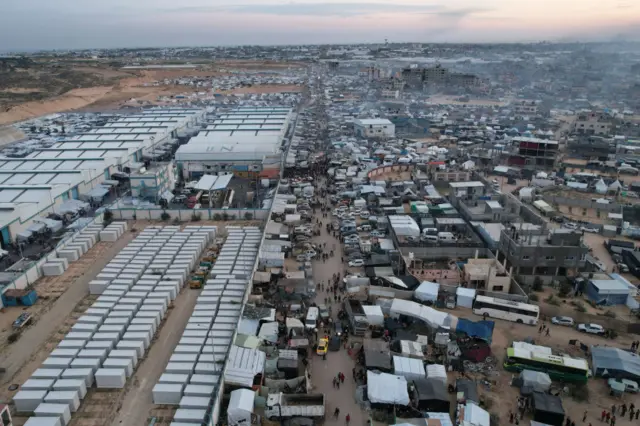 Image source, AFP
Image source, AFPThere is no food, no electricity and serious water shortages in the city of Rafah - the UN humanitarian agency says that Rafah is the only area where very limited supplies are reaching Gazans.
Most people are sleeping on the ground as the shelters are full.
Rafah city, which is on the border with Egypt, has turned into a vast camp for many of the 1.9 million Palestinians who have been internally displaced - 85% of the population of Gaza.
Egypt says that it will not allow Gazans to be pushed to its territory.
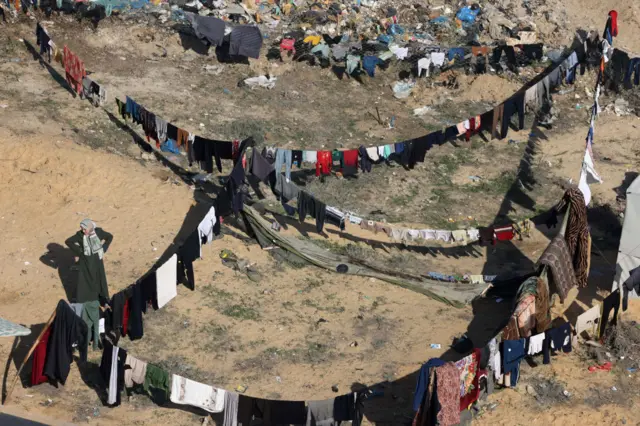 Image source, AFP
Image source, AFPAs we've been reporting, thousands of people having been fleeing to the southern border city of Rafah to escape the fighting in Gaza.
The BBC's Adnan El-Bursh reports that there is no food or electricity, supermarkets are empty and no humanitarian aid is being delivered.
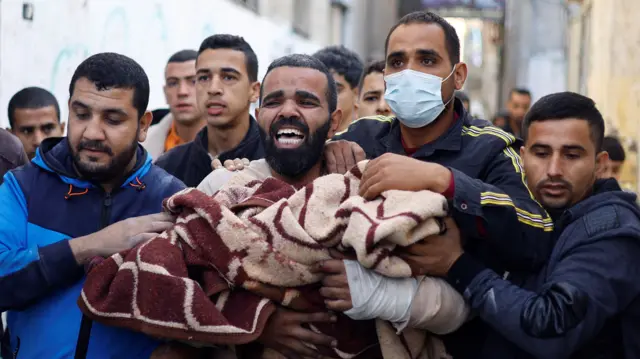 Image source, Reuters
Image source, ReutersA man carrying a child casualty at the site of Israeli shelling in Rafah - in the very south of the Gaza Strip
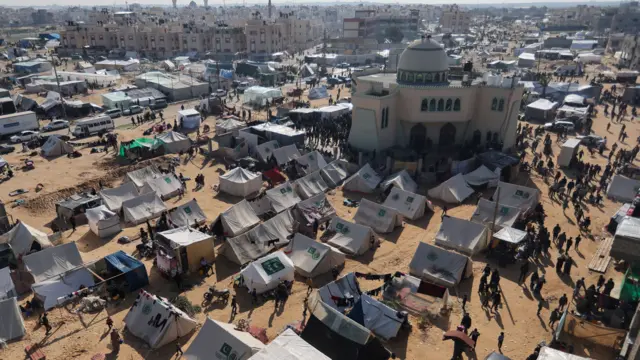 Image source, Reuters
Image source, ReutersTens of thousands of Palestinians have been streaming into the city, with streets packed with newly displaced people and ambulances rushing with the wounded trying to reach hospitals
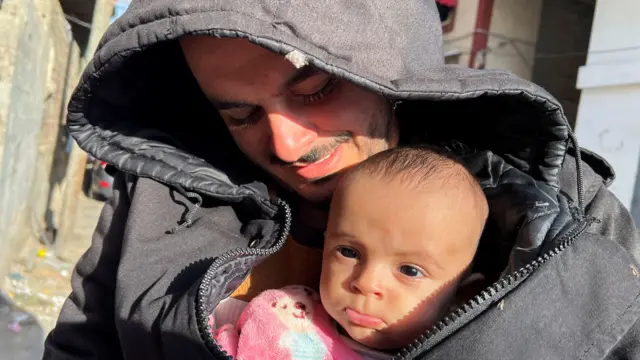 Image source, Reuters
Image source, ReutersThere are severe water and food shortages in Rafah - this man is looking after his niece Shams who's sheltering in the city
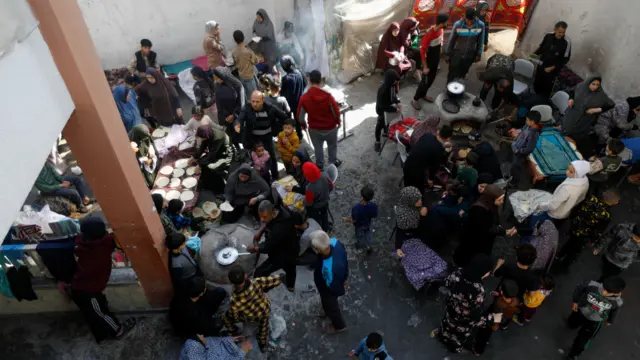 Image source, Reuters
Image source, ReutersThe weather is cold - and while many have found shelter in schools, thousands have been forced to sleep on the ground
Earlier today, the UN humanitarian chief Martin Griffiths gave a dire assessment on the humanitarian situation in Gaza, but said that there were discussions happening with Israel to open the Kerem Shalom crossing.
The Kerem Shalom crossing is located southeast of Rafah, and is solely a commercial goods junction between Israel and southern Gaza.
It was first closed by Israel along with the Erez crossing in north Gaza soon after Hamas attacked Israel on 7 October.
Which means at the moment, the Rafah crossing with Egypt is the only way in and out of the Gaza Strip for both goods and people.
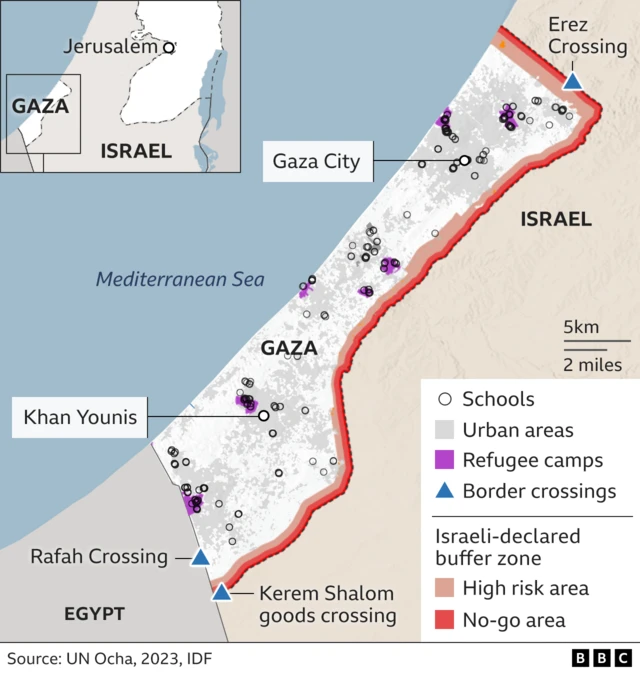 Image source, .
Image source, .IDF reserve soldier Gal Eisenkot - the son of the former IDF chief of staff and a minister in the current emergency government, Gadi Eisenkot - has died during the Israeli military's ground operation in Gaza.
It’s being reported that Gadi Eisenkot heard of his son’s death during a visit to the IDF’s southern command.
Gal Eisenkot was killed after an explosion in a tunnel shaft in Jabalia refugee camp in northern Gaza.
Israeli Prime Minister Benjamin Netanyahu offered his condolences in a post on X.
Imogen Foulkes
Reporting from Geneva
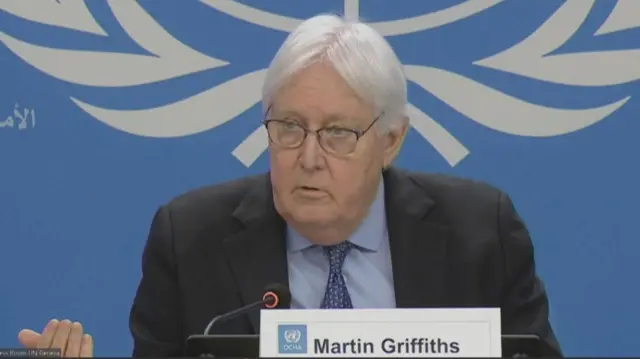 Image source, UNTV
Image source, UNTVThe UN’s humanitarian coordinator says there is no longer any humanitarian operation worthy of the name in southern Gaza.
Speaking in Geneva, Martin Griffiths said that the pace of the military assault in the south of the Gaza Strip replicated what had been seen in the north, meaning there was no safe space for aid agencies to work.
He said that while aid agencies remained in Gaza, and would not abandon its people, they had no sense of clarity, no ability to plan, and no sense of “where this will end.”
Griffiths gave one small note of hope; he said there had been discussions with Israel about opening the Kerem Shalom crossing to allow more humanitarian aid into Gaza.
But aid agencies at the moment are unable to move much beyond Rafah, and Griffiths said that any deliveries within Gaza were purely “opportunistic, erratic, undependable and unsustainable”, relying on finding, at short notice, a road that was not blocked or mined.
The only serious solution, he insisted, was “to silence the guns.”